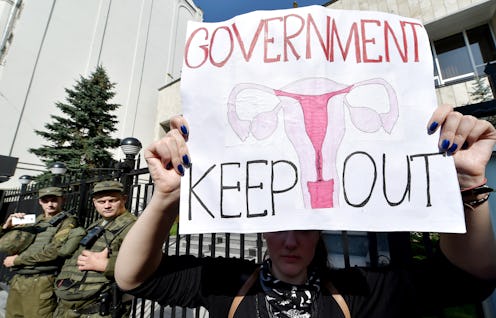News
Why The Mexico City Policy Is Bad For Pro-Lifers

Donald Trump's presidency is off to a predictably anti-choice start. On Monday, Trump issued an executive order to reinstate the Mexico City Policy. The directive, first begun under Ronald Reagan, revokes United States foreign aid to organizations that provide abortion services. Trump's move is unsurprising, since the policy, also referred to as the Global Gag Rule, has been overturned and reinstated several times since its initial implementation. However, despite this controversy, the policy itself is unequivocally bad —and not just for pro-choice advocates.
According to the available data, reimplementation of the Mexico City Policy is unlikely to reduce the number of abortions in the world, but it may definitely have a negative impact on women's health worldwide.
Federal funding already cannot be used to pay for abortions, due to rules like the Hyde Amendment (1976), and the Helms Amendment (1973). As a result, the Mexico City policy is not going to revoke taxpayer money from paying for abortions because the United States government wasn't paying for abortions in the first place. The Mexico City Policy levies an added restriction that costs NGOs their funding just for providing information about accessing abortion services, even if the U.S. aid was going to pay for, say, mammograms. Thus, what may actually happen, now that the Mexico City Policy has been reinstated, is just that the quality of women's healthcare will get worse in some of the places that need it most.
The number of abortions performed worldwide may even increase as a result, as Planned Parenthood President Cecile Richards noted on Twitter.
Reproductive rights advocates have, predictably, been nearly unanimous in their condemnation of the Mexico City Policy. NARAL called it "flawed policy;" Richards wrote that "the world's most vulnerable women will suffer as a direct result of this policy, which undermines years of effort to improve women’s health." Even J.K. Rowling tweeted a link to a Guttmacher Institute study about negative ramifications of the policy, which included prevention of the delivery of condoms to countries experiencing dire AIDS crises.
Moreover, cutting off funding to women's health organizations means that fewer women will have the necessary resources and education to avoid unplanned pregnancy. In 2011, the World Health Organization published a study by Stanford researchers on the effects of the Mexico City Policy when it was previously in effect; the study found "robust empirical patterns suggesting that the Mexico City Policy is associated with increases in abortion rates."
A director at Marie Stopes International, one of the largest family planning groups in the world, told BuzzFeed News that the organization estimates that there will be an additional 2.2 million abortions performed annually.
There's ample evidence that the Mexico City Policy will likely increase the number of abortions worldwide — and make it harder for women to have them in safely.
For these reasons, anti-choice activists should stand opposed to Trump's executive order, too. No matter what side of the abortion debate you're on, the Mexico City Policy has been proven to fail.